|
|
|
Sort Order |
|
|
|
Items / Page
|
|
|
|
|
|
|
| Srl | Item |
| 1 |
ID:
125031
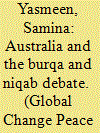

|
|
|
|
|
| Publication |
2013.
|
| Summary/Abstract |
This paper locates the discussion on wearing niqab and burqa within the context of information acquisition and response formation among Muslims and non-Muslims in the contemporary world. The paper argues that, against the backdrop of varied opinions on Islam and Muslims around the world, the debate on wearing burqa represents the continuation - albeit up-scaling - of the focus on Muslim women as the signifiers of Islam and Muslim identities. Australia is influenced by, and dealing with, the debate on whether or not to ban the burqa and niqab. Opinions among both the wider community and Muslims have differed on the justification and advisability of such a ban. The Australian government at the federal and state levels has demonstrated cautious activism in dealing with the issue, thus protecting the rights of Australian Muslim minorities, and reducing the space in which a heightened sense of exclusion could develop among them.
|
|
|
|
|
|
|
|
|
|
|
|
|
|
|
|
| 2 |
ID:
124954


|
|
|
|
|
| Publication |
2013.
|
| Summary/Abstract |
The contemporary Bangladeshi cinema is stained red by the enthusiastic use of fake blood that erupts from bodies pictured in fist fights, gun battles and sword attacks. In this article, I draw on my ethnographic fieldwork in the Bangladesh film industry to illustrate the spurting of fake blood in two popular film genres: mainstream action cinema and straight-to-VCD rural crime stories (kiccha pala VCDs). I suggest that the affective intensity ascribed to blood by film insiders points to the capacity of blood to lend force to the protean and submerged discourses of contemporary Bangladesh presented in these blood-splattered genres. These film forms make use of the excessive and abject quality inherent in this bodily tissue as well as interacting with more regimented and metaphoric uses of blood in the political aesthetics of contemporary Bangladesh that they recycle and pervert.
|
|
|
|
|
|
|
|
|
|
|
|
|
|
|
|
| 3 |
ID:
129263
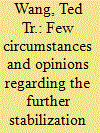

|
|
|
|
|
| Publication |
2012.
|
| Summary/Abstract |
Speech made by Comrade Jiang Zemin at a symposium held during the Sixth Plenary Meeting of the Thirteenth Chinese Party Congress. Today we invite comrades from ethnic border regions and from the Shenyang, Beijing, Lanzhou, and Chengdu military districts who are participating in the present central (committee) plenary meeting to attend a symposium, and we also invite comrades from the various de- partments of the Party Center and the relevant state council departments participating in the plenary meeting to attend in order to study the matter of further stabilizing the ethnic border regions. This indicates that the Party Center, the state council, and the Central Military Commission show great concern for and attach importance to the work in the ethnic border regions
|
|
|
|
|
|
|
|
|
|
|
|
|
|
|
|
| 4 |
ID:
124908
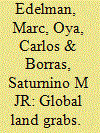

|
|
|
|
|
| Publication |
2013.
|
| Summary/Abstract |
Scholars, practitioners and activists generally agree that investor interest in land has climbed sharply, although they differ about what to call this phenomenon and how to analyse it. This introduction discusses several contested definitional, conceptual, methodological and political issues in the land grab debate. The initial 'making sense' period drew sweeping conclusions from large databases, rapid-appraisal fieldwork and local case studies. Today research examines financialisation of land, 'water grabbing', 'green grabbing' and grabbing for industrial and urbanisation projects, and a substantial literature challenges key assumptions of the early discussion (the emphasis on foreign actors in Africa and on food and biofuels production, the claim that local populations are inevitably displaced or negatively affected). The authors in this collection, representing a diversity of approaches and backgrounds, argue the need to move beyond the basic questions of the 'making sense' period of the debate and share a common commitment to connecting analyses of contemporary land grabbing to its historical antecedents and legal contexts and to longstanding agrarian political economy questions concerning forms of dispossession and accumulation, the role of labour and the impediments to the development of capitalism in agriculture. They call for more rigorous grounding of claims about impacts, for scrutiny of failed projects and for (re)examination of the longue durée, social differentiation, the agency of contending social classes and forms of grassroots resistance as key elements shaping agrarian outcomes.
|
|
|
|
|
|
|
|
|
|
|
|
|
|
|
|
| 5 |
ID:
161496
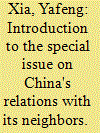

|
|
|
| 6 |
ID:
168188
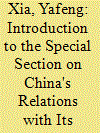

|
|
|
|
|
| Summary/Abstract |
This edition of Asian Perspective features a special section on China's relations with its neighbors, following a full special issue on the topic (Asian Perspective, vol. 42, no. 4, 2018). This special section comprises three articles that offer a historical lens on China's contemporary relations with India, Burma, and Sri Lanka, respectively. Making use of archival documentation from the Chinese Foreign Ministry archives and the Jawaharlal Nehru Memorial Museum and Library, Chaowu Dai explores the evolution of China's policy toward Sino-Indian border disputes. Dai argues that the People's Republic of China (PRC) attempted to peacefully resolve its border disputes with neighboring countries through negotiations. According to Dai, the PRC adopted this approach in resolving its border disputes with Burma, Nepal, and Pakistan prior to the Sino-Indian border clashes in 1959. He thus challenges the view of Indian and Western scholars that China was pursuing territorial expansion.
|
|
|
|
|
|
|
|
|
|
|
|
|
|
|
|
| 7 |
ID:
124836
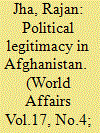

|
|
|
|
|
| Publication |
2013.
|
| Summary/Abstract |
Given the differences between the geographical and socioeconomic basis of the origin of the state in Afghanistan and Europe, it is but obvious that their nature would also differ. The Afghan state directly and indirectly involved various religious institutions, like mosque and Islamic scholars in its day-to-day politics
|
|
|
|
|
|
|
|
|
|
|
|
|
|
|
|
| 8 |
ID:
125037
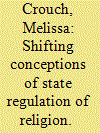

|
|
|
|
|
| Publication |
2013.
|
| Summary/Abstract |
This article seeks to understand how and why states regulate the activities or affairs of religious communities. It does so through a case study of the Indonesian Draft Law on Inter-religious Harmony. The article draws out three general considerations to the study of the dynamics of state regulation of religious affairs: situating modern state approaches to the regulation of religion in historical context; recognizing the framework within which state and religion is structured; and acknowledging the influence of legal norms other than state law. The Indonesian Draft Law on Inter-religious Harmony addresses key debates between Muslims and Christians and within Islam, and it draws upon existing policies of the Ministry of Religion and also of the fatwa of the Indonesian Ulama Council. The shift in state attempts to regulate religion is therefore related to the dynamic and contested nature of the relationship between the branches of government and religious authorities in democratic Indonesia
|
|
|
|
|
|
|
|
|
|
|
|
|
|
|
|
| 9 |
ID:
124491
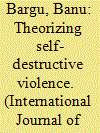

|
|
|
|
|
| Publication |
2013.
|
| Summary/Abstract |
The first image that the question of violence in the Middle East conjures up, especially in the West, is that of the suicide bomber. This association, etched into the political imaginary particularly over the course of the last two decades, is due neither to the number of victims suicide bombing creates (more conventional weapons of war can claim as many or more victims), nor to the identity of its victims (conventional weapons are also often directed at civilians). Rather, the potency of the image of the suicide bomber is connected to the simultaneously self-destructive and other-directed form that this act of violence takes. If the Orientalist impulse that has raised the image of the suicide bomber to iconic status is deeply problematic, it nonetheless constitutes an involuted acknowledgement of a reality: the significant rise in self-destructive violence (and not just in the Middle East). I have in mind practices such as hunger striking, self-immolation, and fatal self-mutilation, which constitute an emergent repertoire of struggle that has come to mark a certain current of radical politics around the globe. Those modalities of self-destructive violence that are not directed at others are overshadowed by suicide bombing.
|
|
|
|
|
|
|
|
|
|
|
|
|
|
|
|
|
|
|
|
|